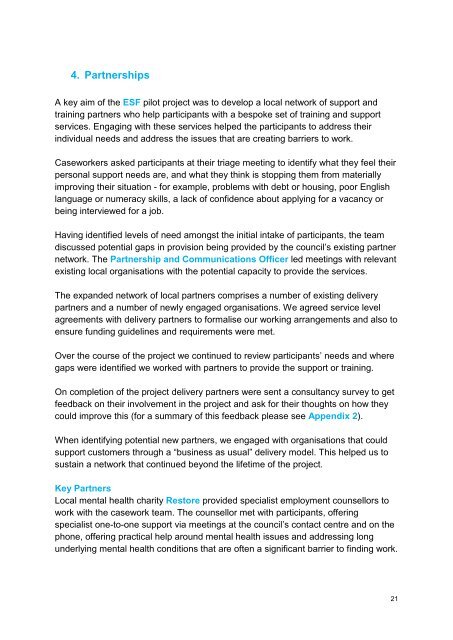Welfare Reform Team Evaluation of European Social Fund pilot project 2014-2015
welfare_reform_european_social_fund_project_evaluation_report
welfare_reform_european_social_fund_project_evaluation_report
You also want an ePaper? Increase the reach of your titles
YUMPU automatically turns print PDFs into web optimized ePapers that Google loves.
4. Partnerships<br />
A key aim <strong>of</strong> the ESF <strong>pilot</strong> <strong>project</strong> was to develop a local network <strong>of</strong> support and<br />
training partners who help participants with a bespoke set <strong>of</strong> training and support<br />
services. Engaging with these services helped the participants to address their<br />
individual needs and address the issues that are creating barriers to work.<br />
Caseworkers asked participants at their triage meeting to identify what they feel their<br />
personal support needs are, and what they think is stopping them from materially<br />
improving their situation - for example, problems with debt or housing, poor English<br />
language or numeracy skills, a lack <strong>of</strong> confidence about applying for a vacancy or<br />
being interviewed for a job.<br />
Having identified levels <strong>of</strong> need amongst the initial intake <strong>of</strong> participants, the team<br />
discussed potential gaps in provision being provided by the council’s existing partner<br />
network. The Partnership and Communications Officer led meetings with relevant<br />
existing local organisations with the potential capacity to provide the services.<br />
The expanded network <strong>of</strong> local partners comprises a number <strong>of</strong> existing delivery<br />
partners and a number <strong>of</strong> newly engaged organisations. We agreed service level<br />
agreements with delivery partners to formalise our working arrangements and also to<br />
ensure funding guidelines and requirements were met.<br />
Over the course <strong>of</strong> the <strong>project</strong> we continued to review participants’ needs and where<br />
gaps were identified we worked with partners to provide the support or training.<br />
On completion <strong>of</strong> the <strong>project</strong> delivery partners were sent a consultancy survey to get<br />
feedback on their involvement in the <strong>project</strong> and ask for their thoughts on how they<br />
could improve this (for a summary <strong>of</strong> this feedback please see Appendix 2).<br />
When identifying potential new partners, we engaged with organisations that could<br />
support customers through a “business as usual” delivery model. This helped us to<br />
sustain a network that continued beyond the lifetime <strong>of</strong> the <strong>project</strong>.<br />
Key Partners<br />
Local mental health charity Restore provided specialist employment counsellors to<br />
work with the casework team. The counsellor met with participants, <strong>of</strong>fering<br />
specialist one-to-one support via meetings at the council’s contact centre and on the<br />
phone, <strong>of</strong>fering practical help around mental health issues and addressing long<br />
underlying mental health conditions that are <strong>of</strong>ten a significant barrier to finding work.<br />
21




